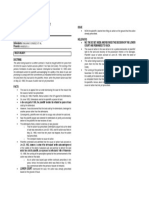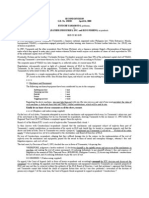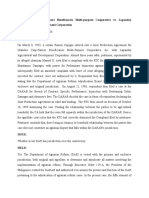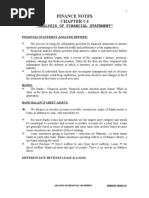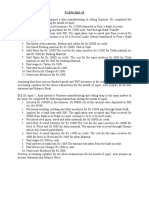Mindanao Savings and Loans Inc Vs Willkom
Mindanao Savings and Loans Inc Vs Willkom
Uploaded by
is_still_artCopyright:
Available Formats
Mindanao Savings and Loans Inc Vs Willkom
Mindanao Savings and Loans Inc Vs Willkom
Uploaded by
is_still_artOriginal Description:
Original Title
Copyright
Available Formats
Share this document
Did you find this document useful?
Is this content inappropriate?
Copyright:
Available Formats
Mindanao Savings and Loans Inc Vs Willkom
Mindanao Savings and Loans Inc Vs Willkom
Uploaded by
is_still_artCopyright:
Available Formats
Topic: Novation, under Art 1293, to be valid, must be done with the consent of the creditor.
Title: Mindanao Savings and Loan Association, Inc. (MSLAI) vs Willkom Facts: - The First Iligan Savings and Loan Association, Inc. (FISLAI) and the Davao Savings and Loan Association, Inc. (DSLAI) are entities duly registered with the Securities and Exchange Commission, primarily engaged in the business of granting loans and receiving deposits from the general public, and treated as banks. - 1985, FISLAI and DSLAI entered into a merger, DSLAI being the surviving corporation. The articles of merger were not registered with the SEC due to incomplete documentation. DSLAI changed its corporate name to MSLAI. - May 26, 1986, The Board of Directors of FSLAI approved the assignment of assets in favor of DSLAI, which assumed FISLAI's liabilities (the novation in question) - MSLAI's business failed and the Monetary Board of the Central Bank of the Philippines ordered its closure. The Monetary Board found that MSLAI was insolvent and to continue business would involve probable loss to its depositors and creditors. The Monetary Board ordered the liquidation of MSLAI with PDIC as its liquidator. - Prior to MSLAI's closure, Uy filed an action for collection of sum of money against FISLAI. RTC rendered a decision in favor of Uy and ordered defendants (including FISLAI) to pay the sum of P136,801.70 plus interest, 25% attorney's fees and the costs of suit. CA modified the decision by ordering the third party defendant to reimburse the payments that would be made by defendants. - April 28, 1993, sheriff Bantuas levied on 6 parcels of land of FSLAI in Cagayan de Oro, and during the public auction, Willkom was the highest bidder. A certificate of sale was issued, and was registered with the Register of Deeds. September 20, 1994, Willkom sold one of the parcels of land to Go. - June 14, 1995, MSLAI, represented by PDIC, filed a complaint for the Annulment of the Sale, Cancellation of Title and Reconveyance of the properties, stating that the sale was conducted without notice given to them and PDIC. PDIC came to know about the sale, almost two years after, while liquidating MSLAI's assets. MSLAI stated that the sale was illegal not only due to lack of notice, but also because the assets under liquidation should be deemed in custodia legis and exempt from garnishment, levy, attachment or execution. - Respondents stated that MSLAI had no cause of action; MSLAI is a separate entity from FSLAI, further stating that the merger was unofficial and did not comply with formalities and procedure. - RTC: dismissed the case for a supposed lack of jurisdiction. - CA affirmed the dismissal but stated that accdg. to Associated Bank vs CA, there was no merger between FISLAI and MSLAI for failure to follow procedure for a valid merger, but even if there was a de facto merger, Willkom was an innocent purchaser and had a superior right. The assignment of assets and liabilities was not binding on third parties because it wasn't registered. The validity of the auction sale could not be invalidated by the fact that the sheriff had no authority to conduct the sale. Issues: 1. Whether the merger between FISLAI and DSLAI valid and effective 2. Whether there was novation of the obligation by substituting the person of the debtor
Held: 1. No. A merger does not become effective upon the mere agreement of the corporations. There must be an express provision of law authorizing them. There is a procedure to be followed as stated in the Corporation Code. The board of each corporation draws up a plan of merger and is submitted to stockholders or members for approval. The formal agreement is executed (the articles of merger) and is submitted to the SEC for approval. If approved, the SEC issues a certificate of merger. The merger shall only be effective upon the issuance of the certificate. (An exception would be if a party to a merger is a special corporation governed by its own charter, then a favorable recommendation of the appropriate government agency should first be obtained.) In this case, no certificate was issued and such merger is incomplete without it. The certificate is important because it bears the approval of the SEC and it marks the moment when the consequences of a merger take place. Since there is no valid merger, FISLAI and MSLAI are still considered as two separate corporations. ASs far as third parties are concerned, FISLAI's assets still belongs to them, not MSLAI. 2. No. The assumption by MSLAI of FISLAI's liabilities did not result in novation. "Novation is the extinguishment of an obligation by the substitution or change of the obligation by a subsequent one which extinguishes or modifies the first, either by changing the object or principal conditions, by substituting another in place of the debtor, or by subrogating a third person in the rights of the creditor." Novation must always be done with the consent of the creditor as stated in Article 1293 of the Civil Code. In this case, it was not shown that Uy consented to the agreement between FISLAI and MSLAI. MSLAI cannot question the levy, and subsequent sale of the properties of FISLAI. Since novation implies a waiver of right which the creditor had before novation, such waiver must be express. *CA ruling affirmed.
You might also like
- Abc Multi-Purpose Cooperative Approving and Signing Authority Policy RationaleDocument8 pagesAbc Multi-Purpose Cooperative Approving and Signing Authority Policy RationaleKhints Ettezil100% (10)
- Comparative Analysis of SBI ICICI BankDocument73 pagesComparative Analysis of SBI ICICI BankNitinAgnihotri80% (10)
- 24 Ramos V CondezDocument1 page24 Ramos V CondezJulius ManaloNo ratings yet
- Agency Digest CasesDocument4 pagesAgency Digest Cases이설아No ratings yet
- AMPARO G. PEREZ, ET AL., Plaintiffs and Appellees, PHILIPPINE NATIONAL BANK, Binalbagan Branch, ET AL., Defendants and Appellants. G.R. No. L-21813 July 30, 1966Document1 pageAMPARO G. PEREZ, ET AL., Plaintiffs and Appellees, PHILIPPINE NATIONAL BANK, Binalbagan Branch, ET AL., Defendants and Appellants. G.R. No. L-21813 July 30, 1966Mitch IsmaelNo ratings yet
- Afisco Insurance Corporation, Et. Al. vs. Court of AppealsDocument2 pagesAfisco Insurance Corporation, Et. Al. vs. Court of AppealsJahn Avery Mitchel DatukonNo ratings yet
- Dominion Insurance Corp V CADocument2 pagesDominion Insurance Corp V CAkdescallarNo ratings yet
- Revenue Regulations No. 02-40Document46 pagesRevenue Regulations No. 02-40zelayneNo ratings yet
- Bucton V Rural Bank of El SalvadorDocument1 pageBucton V Rural Bank of El SalvadorKatherine NovelaNo ratings yet
- Ampatuan vs. de LimaDocument18 pagesAmpatuan vs. de LimaisaaabelrfNo ratings yet
- Lawyers League VsDocument3 pagesLawyers League VsJuralexNo ratings yet
- Infante V Cunanan DigestDocument1 pageInfante V Cunanan DigestColee StiflerNo ratings yet
- Mirasol Vs CADocument2 pagesMirasol Vs CABeyond GodlikeNo ratings yet
- Corporation Law Digest PoolDocument132 pagesCorporation Law Digest PoolcholoNo ratings yet
- SalesDocument102 pagesSalesXhi MiNo ratings yet
- Authority, Compromise Their Client's Litigation, or Receive Anything in DischargeDocument52 pagesAuthority, Compromise Their Client's Litigation, or Receive Anything in DischargeAnonymous wdCD7FeW9XNo ratings yet
- Rocha V Prats - Co.Document3 pagesRocha V Prats - Co.Cathy Belgira100% (1)
- 30 Sulo NG Bayan V AranetaDocument2 pages30 Sulo NG Bayan V AranetaRomNo ratings yet
- SRC DigestDocument27 pagesSRC DigestKelvin ZabatNo ratings yet
- Digest - YASCO V CADocument1 pageDigest - YASCO V CAMaria Anna M LegaspiNo ratings yet
- LABOR, No. 11, DIVINE v. MINADocument1 pageLABOR, No. 11, DIVINE v. MINAKeangela LouiseNo ratings yet
- Evangelista Vs Alto SuretyDocument2 pagesEvangelista Vs Alto SuretyJewel Ivy Balabag DumapiasNo ratings yet
- De Laureano vs. AdilDocument3 pagesDe Laureano vs. AdilRache GutierrezNo ratings yet
- Caneda CADocument4 pagesCaneda CAFebbieKatreennNo ratings yet
- Benchmark DigestDocument21 pagesBenchmark Digestjojitus100% (1)
- Ampatuan, Jr. vs. Sec. de Lima, G.R. No. 197291, April 3, 2013 - DIGESTDocument1 pageAmpatuan, Jr. vs. Sec. de Lima, G.R. No. 197291, April 3, 2013 - DIGESTMctc Nabunturan Mawab-montevistaNo ratings yet
- Ient VS TulletDocument2 pagesIent VS TulletDonnie Ray Olivarez SolonNo ratings yet
- Del Rosario v. FerrerDocument2 pagesDel Rosario v. FerrerGlenn BeringuelaNo ratings yet
- Carmelino Pansacola v. CIRDocument2 pagesCarmelino Pansacola v. CIRVince MontealtoNo ratings yet
- Province of Bulacan v. CADocument2 pagesProvince of Bulacan v. CACarla Louise Bulacan BayquenNo ratings yet
- MIRANDA V PDIC GR NO. 169334, SEPTEMBER 8, 2006Document3 pagesMIRANDA V PDIC GR NO. 169334, SEPTEMBER 8, 2006Kim SabacahanNo ratings yet
- 182 - Clemente v. CADocument2 pages182 - Clemente v. CAmimiyuki_No ratings yet
- Request For Temporary Shop ClosureDocument1 pageRequest For Temporary Shop ClosureApril Lourdes Punzalan AragonNo ratings yet
- Manila Remnant Co., Inc. v. Court of AppealsDocument3 pagesManila Remnant Co., Inc. v. Court of AppealswuplawschoolNo ratings yet
- Sweetheart Loan - Florendo Vs CADocument2 pagesSweetheart Loan - Florendo Vs CAErmeline TampusNo ratings yet
- Philippine Insolvency and Rehabilitation LawsDocument9 pagesPhilippine Insolvency and Rehabilitation Lawsaldrin04No ratings yet
- Case Flow:: SULO NG BAYAN INC., Plaintiff-AppellantDocument1 pageCase Flow:: SULO NG BAYAN INC., Plaintiff-Appellantrhod leysonNo ratings yet
- Citibank Vs Hon ChuaDocument12 pagesCitibank Vs Hon ChuaJA BedrioNo ratings yet
- Atp 13.1-2Document2 pagesAtp 13.1-2jeorgeNo ratings yet
- (Corp) 233 - Wesleyan University V Maglaya - LimDocument2 pages(Corp) 233 - Wesleyan University V Maglaya - LimJosiah LimNo ratings yet
- Credit CasesDocument49 pagesCredit CasesBechay PallasigueNo ratings yet
- Pascual and Dragon V CIR and CTADocument2 pagesPascual and Dragon V CIR and CTAKenneth Peter MolaveNo ratings yet
- Catalan V GatchalianDocument1 pageCatalan V Gatchaliankenken320No ratings yet
- Ruby Industrial Vs CADocument13 pagesRuby Industrial Vs CAJoshua Philip G. ManinantanNo ratings yet
- Ryuichi Yamamoto v. Nishino Leather IndustriesDocument4 pagesRyuichi Yamamoto v. Nishino Leather IndustriesbearzhugNo ratings yet
- Ago vs. CADocument3 pagesAgo vs. CAJan Carlo SanchezNo ratings yet
- Public Corporations Midterm Examination, SY 2022 - 2023 Atty. Ulpiano Z. SarmientoDocument2 pagesPublic Corporations Midterm Examination, SY 2022 - 2023 Atty. Ulpiano Z. SarmientoKarlo Ricaplaza OfracioNo ratings yet
- Claro M. Recto For Petitioners. Ramon Diokno and Jose W. Diokno For RespondentsDocument4 pagesClaro M. Recto For Petitioners. Ramon Diokno and Jose W. Diokno For Respondentsnia_artemis3414No ratings yet
- Banco Filipino V MBDocument3 pagesBanco Filipino V MBReena MaNo ratings yet
- Case No. 81 & 114Document3 pagesCase No. 81 & 114Saira Mae HayoNo ratings yet
- Narra Nickel Mining and Development CorpDocument3 pagesNarra Nickel Mining and Development CorpDwyane Yra DinglasanNo ratings yet
- Zambrano, Et Al. v. Philippine Mfg. Corp.Document2 pagesZambrano, Et Al. v. Philippine Mfg. Corp.Ildefonso HernaezNo ratings yet
- UE Vs PepanioDocument2 pagesUE Vs PepanioCheza BiliranNo ratings yet
- Patrimonio vs. GutierrezDocument2 pagesPatrimonio vs. GutierrezButch Sui GenerisNo ratings yet
- Atlas Consolidated Mining - Devt Corp. Vs CIR GR No. L-26911-January 27, 1981Document3 pagesAtlas Consolidated Mining - Devt Corp. Vs CIR GR No. L-26911-January 27, 1981Nathalie YapNo ratings yet
- Securities and Exchange CommissionDocument6 pagesSecurities and Exchange Commissionayesha jaafarNo ratings yet
- Sotto V RuizDocument1 pageSotto V RuizJames Evan I. ObnamiaNo ratings yet
- Legal Memorandum - Issue On RA 9997Document8 pagesLegal Memorandum - Issue On RA 9997Sylvia VillalobosNo ratings yet
- Padilla Vs Comelec - G.R. No. 103328. October 19, 1992Document3 pagesPadilla Vs Comelec - G.R. No. 103328. October 19, 1992Ebbe DyNo ratings yet
- DUMAS - JD702 - CaseDigest - Mindanao Savings vs. Willkom, 11 G.R No. 178618 - 2010Document2 pagesDUMAS - JD702 - CaseDigest - Mindanao Savings vs. Willkom, 11 G.R No. 178618 - 2010Bon Harold DumasNo ratings yet
- Mindanao Savings vs. WillkomDocument9 pagesMindanao Savings vs. WillkomAnj MerisNo ratings yet
- Mindanao v. WillkomDocument2 pagesMindanao v. Willkomjanatot100% (2)
- Ho Wai Pang Vs PeopleDocument3 pagesHo Wai Pang Vs Peopleis_still_artNo ratings yet
- MMDA Vs Bel-AirDocument4 pagesMMDA Vs Bel-Airis_still_artNo ratings yet
- Nicolas-Lewis Vs COMELECDocument2 pagesNicolas-Lewis Vs COMELECis_still_art100% (2)
- Faelnar Vs PeopleDocument1 pageFaelnar Vs Peopleis_still_art100% (1)
- Garvida Vs SalesDocument1 pageGarvida Vs Salesis_still_art100% (1)
- Meram Vs EdralinDocument2 pagesMeram Vs Edralinis_still_artNo ratings yet
- DIGEST Sanciangco Vs RonoDocument1 pageDIGEST Sanciangco Vs RonoJonjon BeeNo ratings yet
- Peralta Vs COMELECDocument1 pagePeralta Vs COMELECis_still_artNo ratings yet
- Alunan Vs MirasolDocument2 pagesAlunan Vs Mirasolis_still_art100% (1)
- Soliva Vs ComelecDocument2 pagesSoliva Vs Comelecis_still_artNo ratings yet
- Veterans Federation Party Vs COMELECDocument2 pagesVeterans Federation Party Vs COMELECis_still_artNo ratings yet
- Sps Vega Vs SSSDocument2 pagesSps Vega Vs SSSis_still_artNo ratings yet
- Maagad Vs MaagadDocument3 pagesMaagad Vs Maagadis_still_artNo ratings yet
- Gaisano Cagayan, Inc. Vs Insurance Bank of North AmericaDocument1 pageGaisano Cagayan, Inc. Vs Insurance Bank of North Americais_still_artNo ratings yet
- ICMC Vs Calleja..Kapisanan Vs Sec of LaborDocument2 pagesICMC Vs Calleja..Kapisanan Vs Sec of Laboris_still_art100% (1)
- Filinvest Land, Inc Vs CADocument2 pagesFilinvest Land, Inc Vs CAis_still_artNo ratings yet
- Leyte IV Electric Cooperative Vs LeyecoDocument2 pagesLeyte IV Electric Cooperative Vs Leyecois_still_artNo ratings yet
- PIDI Vs NLRC DigestDocument2 pagesPIDI Vs NLRC Digestis_still_art100% (1)
- Maranaw Hotels and Resorts Corp Vs CA, SottoDocument1 pageMaranaw Hotels and Resorts Corp Vs CA, Sottois_still_artNo ratings yet
- Mcom ProjectDocument76 pagesMcom Projectpratikkarkera97No ratings yet
- ENT600 Blueprint Format PDFDocument22 pagesENT600 Blueprint Format PDFMuhd Shoffi50% (2)
- Final Dissertation Project On Ratio AnalysisDocument61 pagesFinal Dissertation Project On Ratio Analysisangel100% (1)
- FINTECH UNIT -IVDocument5 pagesFINTECH UNIT -IVkumudha326100% (1)
- 52608500Document68 pages52608500Anjo Vasquez100% (1)
- 2011.07.26 GO Ms 152.2011.Lsgd Accounting Policy For Kerala Grama PanchaytsDocument102 pages2011.07.26 GO Ms 152.2011.Lsgd Accounting Policy For Kerala Grama PanchaytstheorytidingsNo ratings yet
- 2.international FinanceDocument81 pages2.international FinanceDhawal RajNo ratings yet
- Be2 Multiple Choice QuestionsDocument7 pagesBe2 Multiple Choice QuestionsLương Thị TâmNo ratings yet
- Mahesh Project (1) Copy-1Document53 pagesMahesh Project (1) Copy-1MohmmedKhayyumNo ratings yet
- Greer Police To Host Softball Tournament: Resident: Protect Family GravesDocument20 pagesGreer Police To Host Softball Tournament: Resident: Protect Family GravesgreercitizenNo ratings yet
- Finance Notes Chapter # 4: "Analysis of Financial Statement"Document15 pagesFinance Notes Chapter # 4: "Analysis of Financial Statement"Safuan HalimNo ratings yet
- Sample Credit ReportDocument16 pagesSample Credit ReportNam Khuu100% (1)
- Tambunting V BaelloDocument1 pageTambunting V BaelloSara Andrea SantiagoNo ratings yet
- Note On Monet PolDocument21 pagesNote On Monet Polaudace2009No ratings yet
- 3a MORTGAGEDocument24 pages3a MORTGAGERandom IntrigueNo ratings yet
- International BankingDocument46 pagesInternational BankingPARMANANDNo ratings yet
- Horizontal Vertical AnalysisDocument4 pagesHorizontal Vertical AnalysisAhmedNo ratings yet
- Accounting Ex3.0Document3 pagesAccounting Ex3.0Kanishka Singh RaghuvanshiNo ratings yet
- Water Resources Development Report - Arizona 2011Document58 pagesWater Resources Development Report - Arizona 2011AlanInAZNo ratings yet
- NBFCDocument12 pagesNBFCANJALI SHARMANo ratings yet
- Functions of MoneyDocument7 pagesFunctions of MoneyShayan YasirNo ratings yet
- AA1B Index Statement of AccountsDocument5 pagesAA1B Index Statement of AccountsbscurNo ratings yet
- A Study On Role and Effects of Microfinance Banks in Rural Areas in India 1Document63 pagesA Study On Role and Effects of Microfinance Banks in Rural Areas in India 1Rohit KumarNo ratings yet
- Criminal Complaint of 138Document4 pagesCriminal Complaint of 138Aayush100% (1)
- Disbursement Letter - Houche0116263650Document4 pagesDisbursement Letter - Houche0116263650Sasikumar RamarajNo ratings yet
- CIVREV2 1920 Credit TransactionsDocument132 pagesCIVREV2 1920 Credit TransactionsVince Llamazares Lupango100% (1)
- Nfi ProjectDocument22 pagesNfi ProjectYasi da EthicalNo ratings yet
- A Study On Customer Awareness Towards Loan Products & Services in Bangalore With Special Reference To State Bank of IndiaDocument16 pagesA Study On Customer Awareness Towards Loan Products & Services in Bangalore With Special Reference To State Bank of IndiaDominic SavioNo ratings yet


